Strategies for Managing ADHD Challenges in Children: An Essay
VerifiedAdded on 2022/08/12
|5
|1686
|52
Essay
AI Summary
This essay addresses Attention-Deficit Hyperactivity Disorder (ADHD) in children, defining the disorder and its impact on behavior, particularly in educational settings. It highlights the challenges teachers encounter when working with ADHD children, such as managing impulsivity, emotional outbursts, and difficulties with focus and attention. The essay then proposes effective strategies to mitigate these challenges, including using interactive games and rewards, providing positive attention, setting clear expectations, and utilizing familiar objects to create a supportive environment. The importance of consistent routines, physical contact, and open communication is also emphasized, providing a comprehensive overview of practical approaches to support children with ADHD. The essay concludes by reiterating the significance of understanding and addressing the unique needs of these children to facilitate their successful integration and learning.
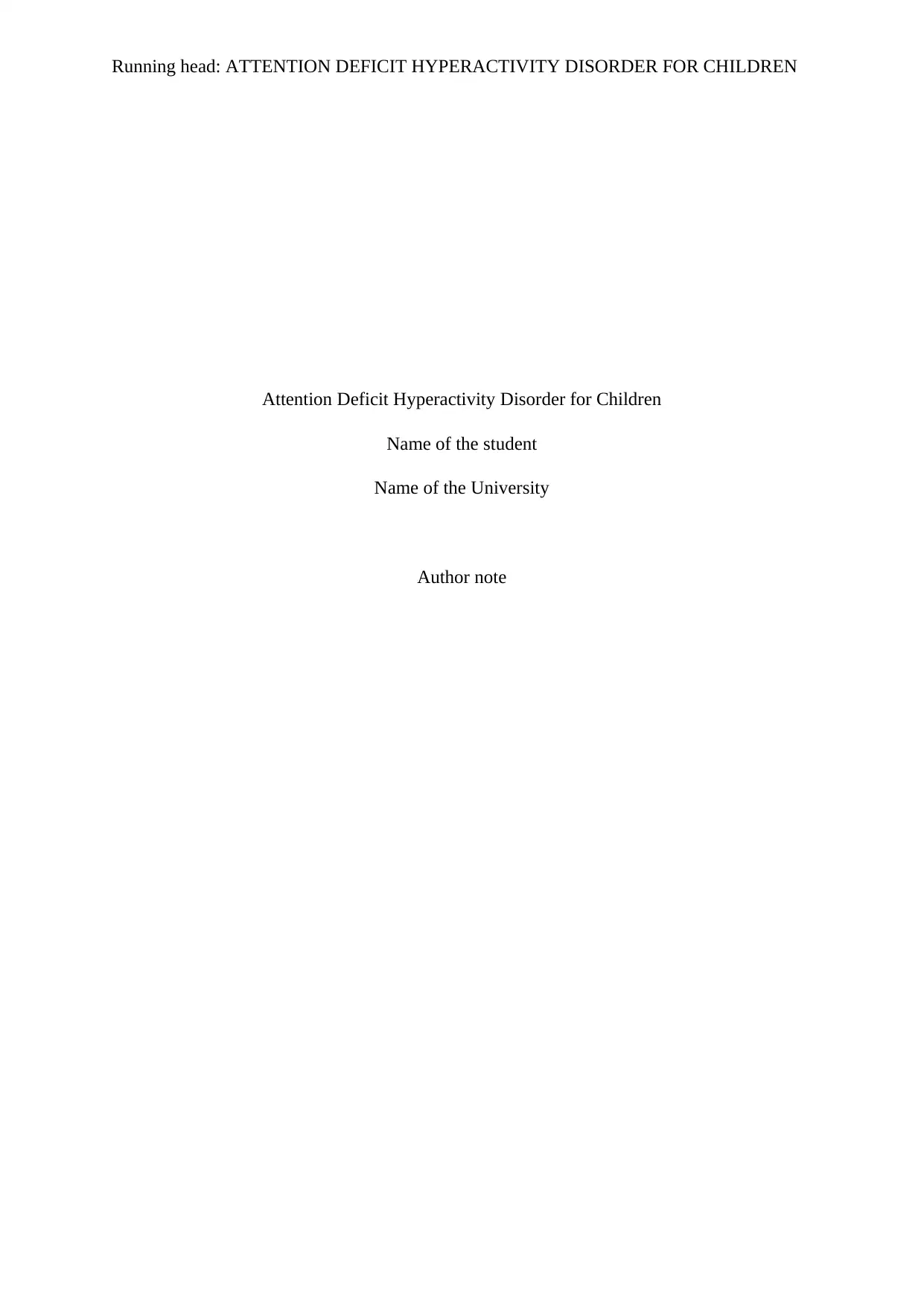
Running head: ATTENTION DEFICIT HYPERACTIVITY DISORDER FOR CHILDREN
Attention Deficit Hyperactivity Disorder for Children
Name of the student
Name of the University
Author note
Attention Deficit Hyperactivity Disorder for Children
Name of the student
Name of the University
Author note
Paraphrase This Document
Need a fresh take? Get an instant paraphrase of this document with our AI Paraphraser
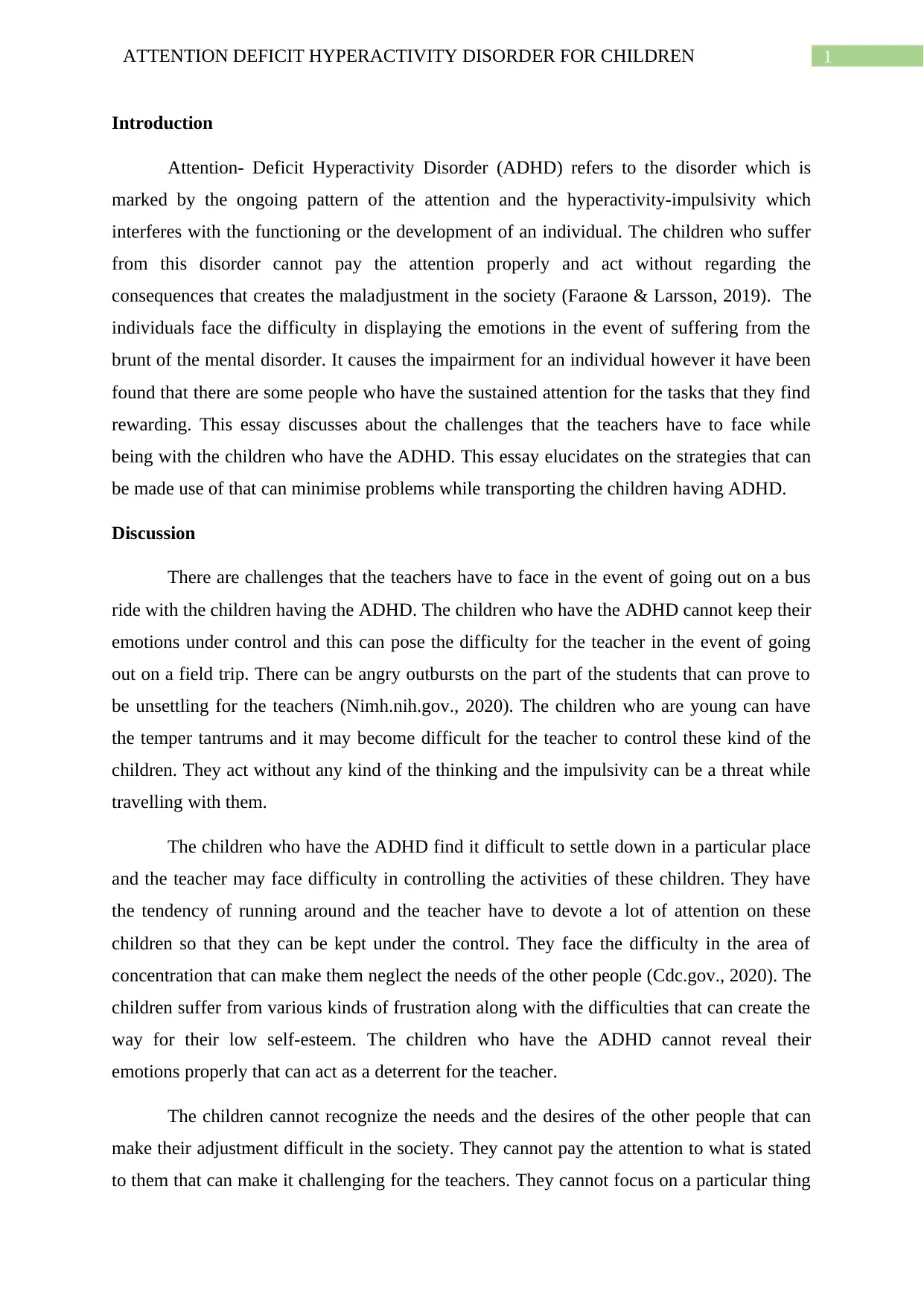
1ATTENTION DEFICIT HYPERACTIVITY DISORDER FOR CHILDREN
Introduction
Attention- Deficit Hyperactivity Disorder (ADHD) refers to the disorder which is
marked by the ongoing pattern of the attention and the hyperactivity-impulsivity which
interferes with the functioning or the development of an individual. The children who suffer
from this disorder cannot pay the attention properly and act without regarding the
consequences that creates the maladjustment in the society (Faraone & Larsson, 2019). The
individuals face the difficulty in displaying the emotions in the event of suffering from the
brunt of the mental disorder. It causes the impairment for an individual however it have been
found that there are some people who have the sustained attention for the tasks that they find
rewarding. This essay discusses about the challenges that the teachers have to face while
being with the children who have the ADHD. This essay elucidates on the strategies that can
be made use of that can minimise problems while transporting the children having ADHD.
Discussion
There are challenges that the teachers have to face in the event of going out on a bus
ride with the children having the ADHD. The children who have the ADHD cannot keep their
emotions under control and this can pose the difficulty for the teacher in the event of going
out on a field trip. There can be angry outbursts on the part of the students that can prove to
be unsettling for the teachers (Nimh.nih.gov., 2020). The children who are young can have
the temper tantrums and it may become difficult for the teacher to control these kind of the
children. They act without any kind of the thinking and the impulsivity can be a threat while
travelling with them.
The children who have the ADHD find it difficult to settle down in a particular place
and the teacher may face difficulty in controlling the activities of these children. They have
the tendency of running around and the teacher have to devote a lot of attention on these
children so that they can be kept under the control. They face the difficulty in the area of
concentration that can make them neglect the needs of the other people (Cdc.gov., 2020). The
children suffer from various kinds of frustration along with the difficulties that can create the
way for their low self-esteem. The children who have the ADHD cannot reveal their
emotions properly that can act as a deterrent for the teacher.
The children cannot recognize the needs and the desires of the other people that can
make their adjustment difficult in the society. They cannot pay the attention to what is stated
to them that can make it challenging for the teachers. They cannot focus on a particular thing
Introduction
Attention- Deficit Hyperactivity Disorder (ADHD) refers to the disorder which is
marked by the ongoing pattern of the attention and the hyperactivity-impulsivity which
interferes with the functioning or the development of an individual. The children who suffer
from this disorder cannot pay the attention properly and act without regarding the
consequences that creates the maladjustment in the society (Faraone & Larsson, 2019). The
individuals face the difficulty in displaying the emotions in the event of suffering from the
brunt of the mental disorder. It causes the impairment for an individual however it have been
found that there are some people who have the sustained attention for the tasks that they find
rewarding. This essay discusses about the challenges that the teachers have to face while
being with the children who have the ADHD. This essay elucidates on the strategies that can
be made use of that can minimise problems while transporting the children having ADHD.
Discussion
There are challenges that the teachers have to face in the event of going out on a bus
ride with the children having the ADHD. The children who have the ADHD cannot keep their
emotions under control and this can pose the difficulty for the teacher in the event of going
out on a field trip. There can be angry outbursts on the part of the students that can prove to
be unsettling for the teachers (Nimh.nih.gov., 2020). The children who are young can have
the temper tantrums and it may become difficult for the teacher to control these kind of the
children. They act without any kind of the thinking and the impulsivity can be a threat while
travelling with them.
The children who have the ADHD find it difficult to settle down in a particular place
and the teacher may face difficulty in controlling the activities of these children. They have
the tendency of running around and the teacher have to devote a lot of attention on these
children so that they can be kept under the control. They face the difficulty in the area of
concentration that can make them neglect the needs of the other people (Cdc.gov., 2020). The
children suffer from various kinds of frustration along with the difficulties that can create the
way for their low self-esteem. The children who have the ADHD cannot reveal their
emotions properly that can act as a deterrent for the teacher.
The children cannot recognize the needs and the desires of the other people that can
make their adjustment difficult in the society. They cannot pay the attention to what is stated
to them that can make it challenging for the teachers. They cannot focus on a particular thing
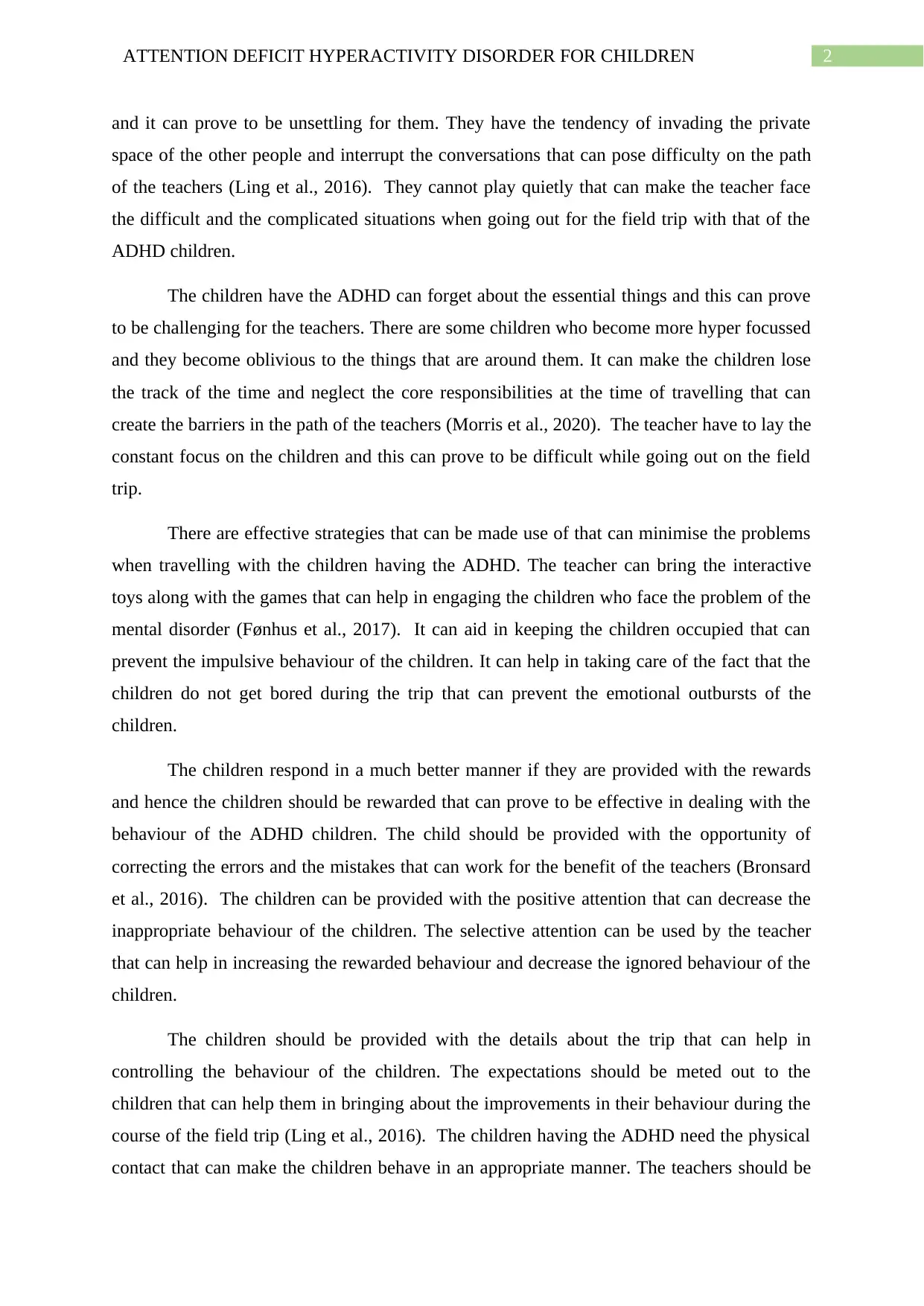
2ATTENTION DEFICIT HYPERACTIVITY DISORDER FOR CHILDREN
and it can prove to be unsettling for them. They have the tendency of invading the private
space of the other people and interrupt the conversations that can pose difficulty on the path
of the teachers (Ling et al., 2016). They cannot play quietly that can make the teacher face
the difficult and the complicated situations when going out for the field trip with that of the
ADHD children.
The children have the ADHD can forget about the essential things and this can prove
to be challenging for the teachers. There are some children who become more hyper focussed
and they become oblivious to the things that are around them. It can make the children lose
the track of the time and neglect the core responsibilities at the time of travelling that can
create the barriers in the path of the teachers (Morris et al., 2020). The teacher have to lay the
constant focus on the children and this can prove to be difficult while going out on the field
trip.
There are effective strategies that can be made use of that can minimise the problems
when travelling with the children having the ADHD. The teacher can bring the interactive
toys along with the games that can help in engaging the children who face the problem of the
mental disorder (Fønhus et al., 2017). It can aid in keeping the children occupied that can
prevent the impulsive behaviour of the children. It can help in taking care of the fact that the
children do not get bored during the trip that can prevent the emotional outbursts of the
children.
The children respond in a much better manner if they are provided with the rewards
and hence the children should be rewarded that can prove to be effective in dealing with the
behaviour of the ADHD children. The child should be provided with the opportunity of
correcting the errors and the mistakes that can work for the benefit of the teachers (Bronsard
et al., 2016). The children can be provided with the positive attention that can decrease the
inappropriate behaviour of the children. The selective attention can be used by the teacher
that can help in increasing the rewarded behaviour and decrease the ignored behaviour of the
children.
The children should be provided with the details about the trip that can help in
controlling the behaviour of the children. The expectations should be meted out to the
children that can help them in bringing about the improvements in their behaviour during the
course of the field trip (Ling et al., 2016). The children having the ADHD need the physical
contact that can make the children behave in an appropriate manner. The teachers should be
and it can prove to be unsettling for them. They have the tendency of invading the private
space of the other people and interrupt the conversations that can pose difficulty on the path
of the teachers (Ling et al., 2016). They cannot play quietly that can make the teacher face
the difficult and the complicated situations when going out for the field trip with that of the
ADHD children.
The children have the ADHD can forget about the essential things and this can prove
to be challenging for the teachers. There are some children who become more hyper focussed
and they become oblivious to the things that are around them. It can make the children lose
the track of the time and neglect the core responsibilities at the time of travelling that can
create the barriers in the path of the teachers (Morris et al., 2020). The teacher have to lay the
constant focus on the children and this can prove to be difficult while going out on the field
trip.
There are effective strategies that can be made use of that can minimise the problems
when travelling with the children having the ADHD. The teacher can bring the interactive
toys along with the games that can help in engaging the children who face the problem of the
mental disorder (Fønhus et al., 2017). It can aid in keeping the children occupied that can
prevent the impulsive behaviour of the children. It can help in taking care of the fact that the
children do not get bored during the trip that can prevent the emotional outbursts of the
children.
The children respond in a much better manner if they are provided with the rewards
and hence the children should be rewarded that can prove to be effective in dealing with the
behaviour of the ADHD children. The child should be provided with the opportunity of
correcting the errors and the mistakes that can work for the benefit of the teachers (Bronsard
et al., 2016). The children can be provided with the positive attention that can decrease the
inappropriate behaviour of the children. The selective attention can be used by the teacher
that can help in increasing the rewarded behaviour and decrease the ignored behaviour of the
children.
The children should be provided with the details about the trip that can help in
controlling the behaviour of the children. The expectations should be meted out to the
children that can help them in bringing about the improvements in their behaviour during the
course of the field trip (Ling et al., 2016). The children having the ADHD need the physical
contact that can make the children behave in an appropriate manner. The teachers should be
⊘ This is a preview!⊘
Do you want full access?
Subscribe today to unlock all pages.

Trusted by 1+ million students worldwide
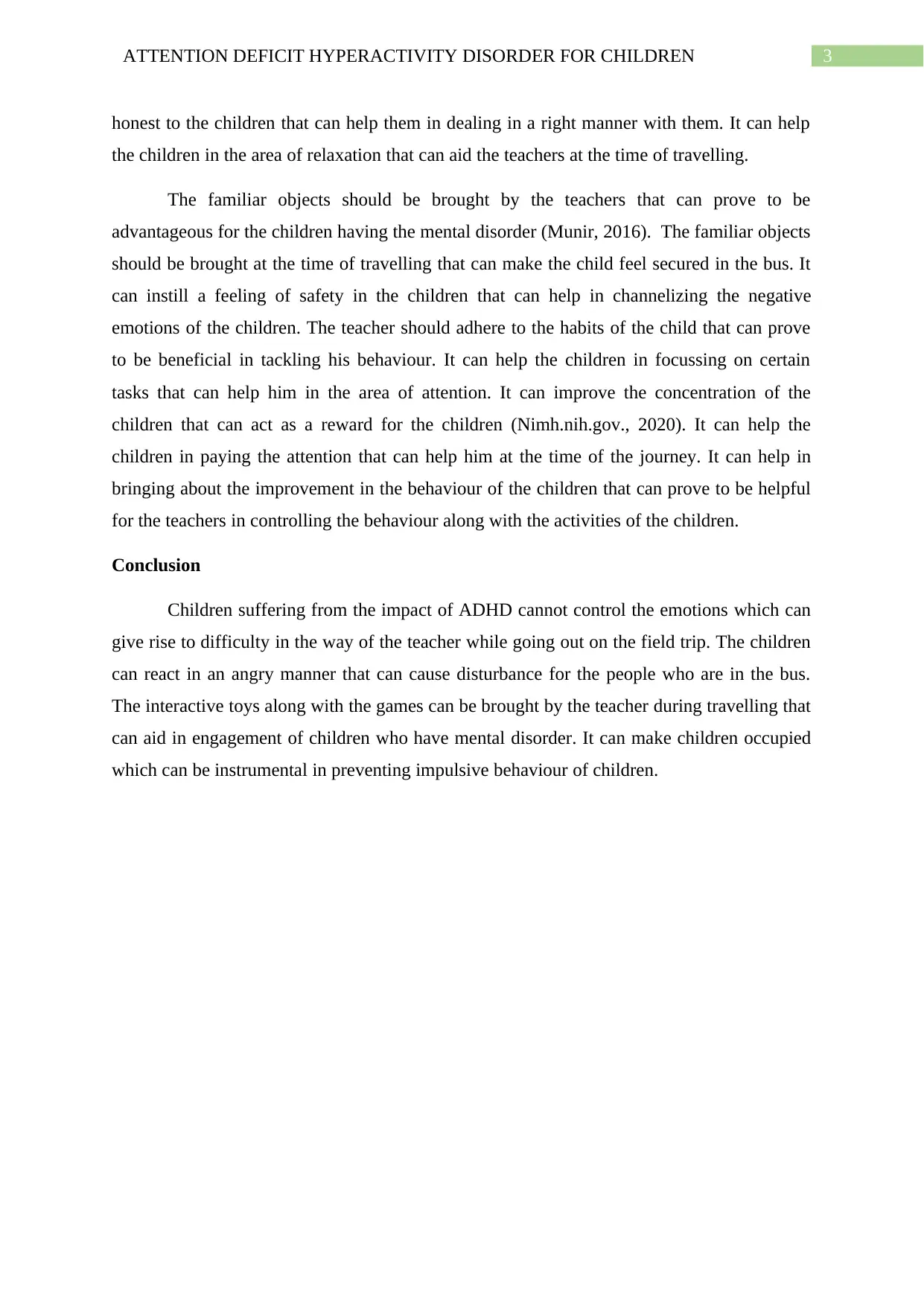
3ATTENTION DEFICIT HYPERACTIVITY DISORDER FOR CHILDREN
honest to the children that can help them in dealing in a right manner with them. It can help
the children in the area of relaxation that can aid the teachers at the time of travelling.
The familiar objects should be brought by the teachers that can prove to be
advantageous for the children having the mental disorder (Munir, 2016). The familiar objects
should be brought at the time of travelling that can make the child feel secured in the bus. It
can instill a feeling of safety in the children that can help in channelizing the negative
emotions of the children. The teacher should adhere to the habits of the child that can prove
to be beneficial in tackling his behaviour. It can help the children in focussing on certain
tasks that can help him in the area of attention. It can improve the concentration of the
children that can act as a reward for the children (Nimh.nih.gov., 2020). It can help the
children in paying the attention that can help him at the time of the journey. It can help in
bringing about the improvement in the behaviour of the children that can prove to be helpful
for the teachers in controlling the behaviour along with the activities of the children.
Conclusion
Children suffering from the impact of ADHD cannot control the emotions which can
give rise to difficulty in the way of the teacher while going out on the field trip. The children
can react in an angry manner that can cause disturbance for the people who are in the bus.
The interactive toys along with the games can be brought by the teacher during travelling that
can aid in engagement of children who have mental disorder. It can make children occupied
which can be instrumental in preventing impulsive behaviour of children.
honest to the children that can help them in dealing in a right manner with them. It can help
the children in the area of relaxation that can aid the teachers at the time of travelling.
The familiar objects should be brought by the teachers that can prove to be
advantageous for the children having the mental disorder (Munir, 2016). The familiar objects
should be brought at the time of travelling that can make the child feel secured in the bus. It
can instill a feeling of safety in the children that can help in channelizing the negative
emotions of the children. The teacher should adhere to the habits of the child that can prove
to be beneficial in tackling his behaviour. It can help the children in focussing on certain
tasks that can help him in the area of attention. It can improve the concentration of the
children that can act as a reward for the children (Nimh.nih.gov., 2020). It can help the
children in paying the attention that can help him at the time of the journey. It can help in
bringing about the improvement in the behaviour of the children that can prove to be helpful
for the teachers in controlling the behaviour along with the activities of the children.
Conclusion
Children suffering from the impact of ADHD cannot control the emotions which can
give rise to difficulty in the way of the teacher while going out on the field trip. The children
can react in an angry manner that can cause disturbance for the people who are in the bus.
The interactive toys along with the games can be brought by the teacher during travelling that
can aid in engagement of children who have mental disorder. It can make children occupied
which can be instrumental in preventing impulsive behaviour of children.
Paraphrase This Document
Need a fresh take? Get an instant paraphrase of this document with our AI Paraphraser
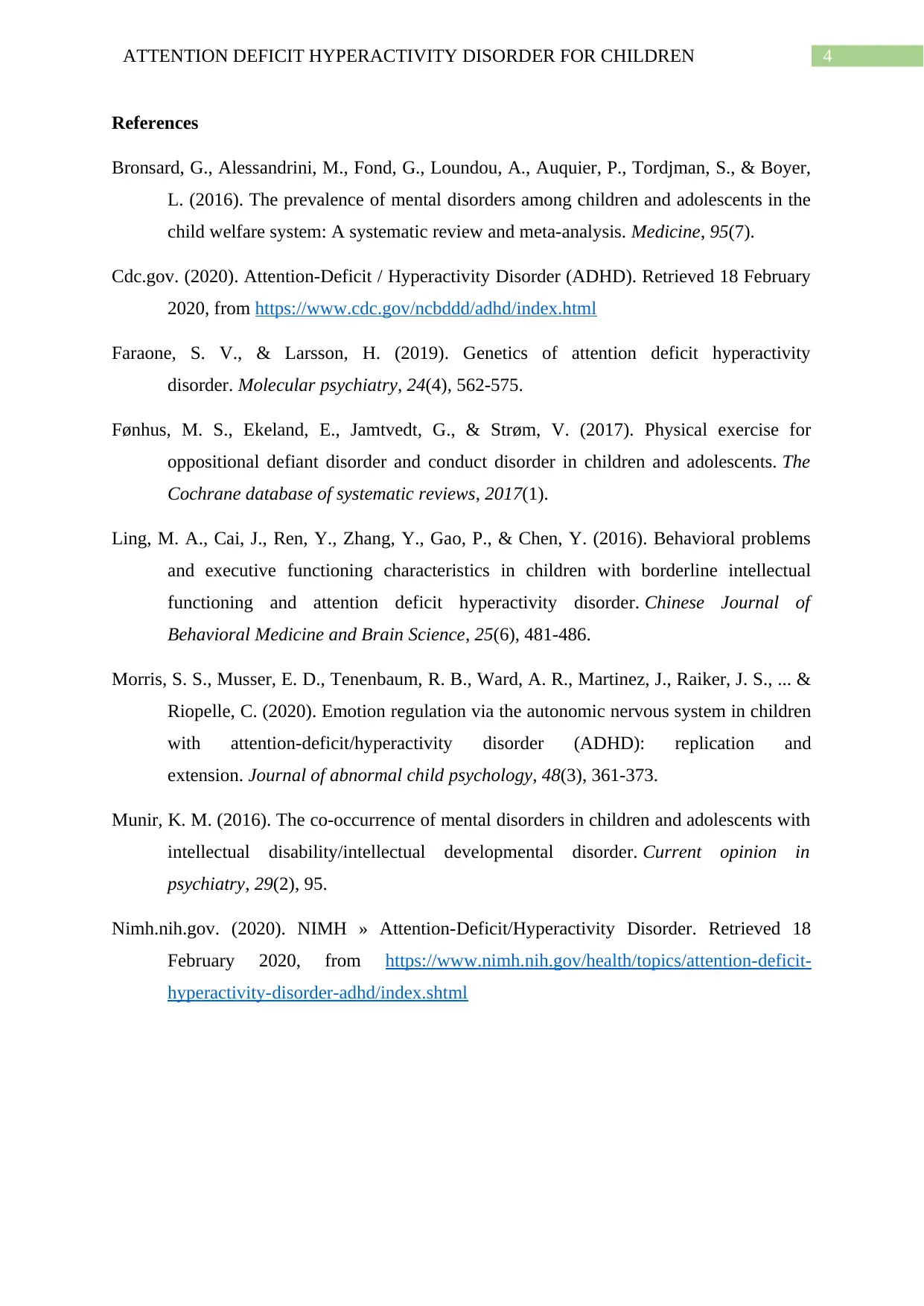
4ATTENTION DEFICIT HYPERACTIVITY DISORDER FOR CHILDREN
References
Bronsard, G., Alessandrini, M., Fond, G., Loundou, A., Auquier, P., Tordjman, S., & Boyer,
L. (2016). The prevalence of mental disorders among children and adolescents in the
child welfare system: A systematic review and meta-analysis. Medicine, 95(7).
Cdc.gov. (2020). Attention-Deficit / Hyperactivity Disorder (ADHD). Retrieved 18 February
2020, from https://www.cdc.gov/ncbddd/adhd/index.html
Faraone, S. V., & Larsson, H. (2019). Genetics of attention deficit hyperactivity
disorder. Molecular psychiatry, 24(4), 562-575.
Fønhus, M. S., Ekeland, E., Jamtvedt, G., & Strøm, V. (2017). Physical exercise for
oppositional defiant disorder and conduct disorder in children and adolescents. The
Cochrane database of systematic reviews, 2017(1).
Ling, M. A., Cai, J., Ren, Y., Zhang, Y., Gao, P., & Chen, Y. (2016). Behavioral problems
and executive functioning characteristics in children with borderline intellectual
functioning and attention deficit hyperactivity disorder. Chinese Journal of
Behavioral Medicine and Brain Science, 25(6), 481-486.
Morris, S. S., Musser, E. D., Tenenbaum, R. B., Ward, A. R., Martinez, J., Raiker, J. S., ... &
Riopelle, C. (2020). Emotion regulation via the autonomic nervous system in children
with attention-deficit/hyperactivity disorder (ADHD): replication and
extension. Journal of abnormal child psychology, 48(3), 361-373.
Munir, K. M. (2016). The co-occurrence of mental disorders in children and adolescents with
intellectual disability/intellectual developmental disorder. Current opinion in
psychiatry, 29(2), 95.
Nimh.nih.gov. (2020). NIMH » Attention-Deficit/Hyperactivity Disorder. Retrieved 18
February 2020, from https://www.nimh.nih.gov/health/topics/attention-deficit-
hyperactivity-disorder-adhd/index.shtml
References
Bronsard, G., Alessandrini, M., Fond, G., Loundou, A., Auquier, P., Tordjman, S., & Boyer,
L. (2016). The prevalence of mental disorders among children and adolescents in the
child welfare system: A systematic review and meta-analysis. Medicine, 95(7).
Cdc.gov. (2020). Attention-Deficit / Hyperactivity Disorder (ADHD). Retrieved 18 February
2020, from https://www.cdc.gov/ncbddd/adhd/index.html
Faraone, S. V., & Larsson, H. (2019). Genetics of attention deficit hyperactivity
disorder. Molecular psychiatry, 24(4), 562-575.
Fønhus, M. S., Ekeland, E., Jamtvedt, G., & Strøm, V. (2017). Physical exercise for
oppositional defiant disorder and conduct disorder in children and adolescents. The
Cochrane database of systematic reviews, 2017(1).
Ling, M. A., Cai, J., Ren, Y., Zhang, Y., Gao, P., & Chen, Y. (2016). Behavioral problems
and executive functioning characteristics in children with borderline intellectual
functioning and attention deficit hyperactivity disorder. Chinese Journal of
Behavioral Medicine and Brain Science, 25(6), 481-486.
Morris, S. S., Musser, E. D., Tenenbaum, R. B., Ward, A. R., Martinez, J., Raiker, J. S., ... &
Riopelle, C. (2020). Emotion regulation via the autonomic nervous system in children
with attention-deficit/hyperactivity disorder (ADHD): replication and
extension. Journal of abnormal child psychology, 48(3), 361-373.
Munir, K. M. (2016). The co-occurrence of mental disorders in children and adolescents with
intellectual disability/intellectual developmental disorder. Current opinion in
psychiatry, 29(2), 95.
Nimh.nih.gov. (2020). NIMH » Attention-Deficit/Hyperactivity Disorder. Retrieved 18
February 2020, from https://www.nimh.nih.gov/health/topics/attention-deficit-
hyperactivity-disorder-adhd/index.shtml
1 out of 5
Related Documents
Your All-in-One AI-Powered Toolkit for Academic Success.
+13062052269
info@desklib.com
Available 24*7 on WhatsApp / Email
![[object Object]](/_next/static/media/star-bottom.7253800d.svg)
Unlock your academic potential
Copyright © 2020–2026 A2Z Services. All Rights Reserved. Developed and managed by ZUCOL.





